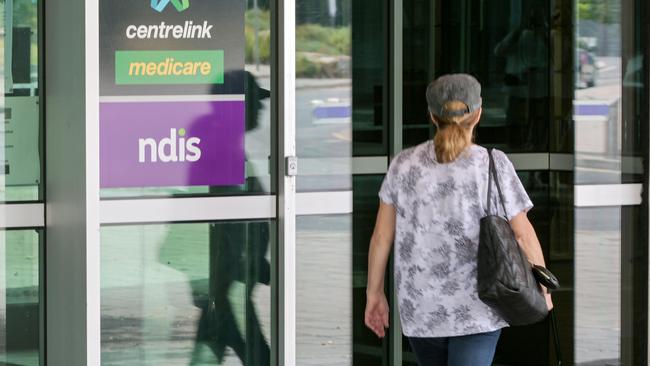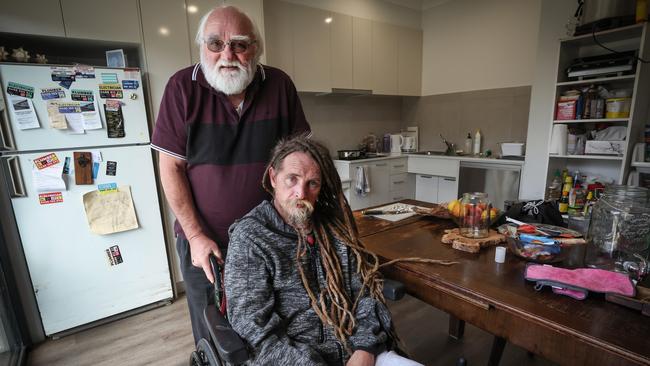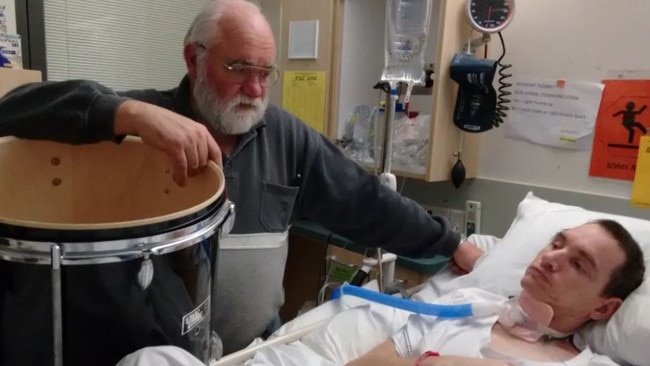Australian law firms made $37m representing ‘failing’ NDIS amid calls for royal commission
Pensioner Mark Toomey, whose son Geoff suffered a brain haemorrhage, has been asked to re-prove his son’s disabilities. See who’s making millions off the failing scheme.
National
Don't miss out on the headlines from National. Followed categories will be added to My News.
Exclusive: Calls are being made for a royal commission into the “failing” NDIS which is being accused of “doctor shopping” and wasting millions of dollars of public money on hotshot lawyers for tribunal cases they have little chance of winning.
A series of Freedom of Information requests reveal the real winners of these failings are the lawyers, with the agency paying an astonishing $37m to external legal teams in the last financial year.
One firm, MinterEllison, was paid more than $9m for its work representing the agency at tribunal, while HWL Ebsworth and Maddocks both received more than $7m each.
And, the number of cases lodged at tribunal are increasing. In the first half of this financial year there have been 3794 lodgements, compared with 4271 for the entire previous financial year.
The latest data shows the rate of NDIS decisions changed during the tribunal process, which includes cases resolved before a hearing, has soared from 58 per cent to 70 per cent since 2022; the worst results of any public service.

As well as the huge legal bill, the agency has been accused of ignoring reports by highly qualified medical specialists, deferring to their own in-house experts when deciding on the needs of an individual.
The agency, or law firms, also pay “independent experts” to give evidence at tribunals, with one coming up with the barmy idea that an intellectually disabled teenager should help care for his young disabled brother, making the recommendation without ever meeting either of them.
Bob Buckley, Co-convener, Autism Aspergers Advocacy Australia, and an advocate for families at tribunals, said the agency was “doctor shopping”.
In one case before the tribunal, a doctor widely regarded as an expert for early intervention for autistic children, along with two other paediatricians, recommended a child receive “intensive intervention”. Nevertheless, the NDIA hired their own expert, who concluded the child needed only “moderate intervention”.
A Freedom of Information report revealed one expert has received more than $135,000 from the NDIA for tribunal work.
Pensioner Mark Toomey, whose 35-year-old son Geoff suffered a spontaneous brain haemorrhage 10 years ago, which destroyed half his brain, said it was farcical and that every year his son was asked to re-prove his “unchanging disabilities”, with the agency often ignoring the reports submitted. He estimates the total cost of these reports, in his son’s case alone, was around $200,000.
Last week NDIA CEO Rebecca Falkingham made a shocking admission at Senate Estimates when she said staff were not able to read “280 page” clinical reports.
“The NDIS is an appalling mystery box in terms of where does the money go?” Mr Toomey. “The traceability, the accountability in the whole system is appalling.”
Mr Toomey claimed the scheme had become the “new Robodebt” because of the way the agency treats participants.


He said legislation brought in late last year, allowing bureaucrats to reassess people’s plans at any time, has seen funding suddenly cut, leaving those impacted at breaking point or suicidal.
A Change.org petition started last month against the NDIS cutting kids’ plans has 7700 signatures.
Mr Toomey, based in Melbourne, said he’s in touch with 900 people who say they’ve been harmed by the NDIA’s actions and want to sue.
He said a royal commission was needed to show the level of misfeasance in public office, as well as lay bare the financial failings.
Staff wages have also ballooned by more than a quarter of a billion dollars since the last election.
An NDIA spokesman said the NDIS Act expressly requires human decision-making and “it is incorrect to connect the NDIS in any way, shape or form to Robodebt and doing so is unfounded, irresponsible and may cause unnecessary distress and harm.”
The NDIA added it strives to resolve matters with participants before they reach a tribunal.
“However, we will challenge cases when necessary to ensure taxpayer funds are used appropriately and not for items such as personal chefs, massage chairs, elective surgery, holidays, and other non-NDIS supports,” the spokesman said.
An Administrative Review Tribunal spokesman said it “finalised around 70 per cent of applications by agreement between the parties rather than through a decision by a tribunal member.”
Additional reporting from data journalist Annabel Fleming.
More Coverage
Originally published as Australian law firms made $37m representing ‘failing’ NDIS amid calls for royal commission





